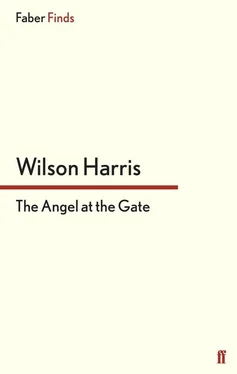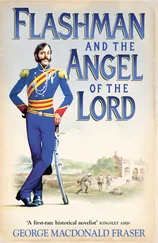She disembarked at the docks on her return from India. It was March. A veiled and rainy month. But there came the occasional spectral day, lucid as a moment of rainwater in which Jenny Diver lurked accompanied by the shadow of Sukey Tawdrey. On one such day, overshot by mist, Mary wheeled her three-year-old miracle of a son to Paradise Park. They stopped at the entrance to admire a magnolia tree swarming with flowers curled and white and still, yet seeming to run along the branches like a flock of birds preening their feathers for flight.
“They bloom,” Mary said to John, “and then in a flash they’re gone until next spring.” She paused and added under her breath but John seemed to hear, “A dangerous mystery is human paradise.”
“Why dangerous?” precocious infant asked.
Joseph replied out of hidden retreat in pooled nature but Mary alone heard. “Dangerous, child, because flowers and birds mimic each other’s timeless return around the seasons, yet rarely tell how vulnerable the cycle of nature is, that that return needs to be woven with care. Such rarity of infinite care is the mutual genius of flower and bird — divisions within divisions — mimicries within unravelled mimicries — marriageable creations, birds, beasts, flowers. You shall see….” His voice descended into the pool and left her to ponder the truth.
They were now through the gate of the Park and abreast a sentry box from which an attendant emerged. For a flashing moment Mary was convinced that this was the man who had exposed himself to Stella under the bedroom window but when he spoke the resemblance fled like water from a duck’s back. Mary was startled, conscience-stricken, even amused. How could she recognize a man Stella alone had seen and whose existence Sebastian and she had doubted? Hypnosis perhaps … It was one of those meaningful distortions of voice and self that prepare one to review, she felt, all one’s biased judgements. Poor Stella. Poor Lucy. Indeed diminutive twentieth-century Mary, she thought, as if she stood a faint cosmos outside of herself, solidly present, yet hidden in space with Joseph and the others. Were spectres of solid presence, hidden presence, aspects of what Joseph had called “divisions within divisions — mimicries within unravelled mimicries” to bring home to one an organic necessity for mutual genius if one were to sift again and again daemonic cruelty, daemonic mimicry of “marriageable creation” and so perceive that the human psyche in such marriage is subtly other than virgin isolation and subtly akin to metaphysical game that doubles the animal kingdom into regions of spirit?
She was lost and startled by such game mixed up in “mimicries within unravelled mimicries” and scarcely caught the import of what the attendant was saying until John tugged at her hand.
“I’m sorry, madam,” the attendant was saying. “I know how you feel but I must ask you again for your bag.”
“My bag?”
“We need to examine bags and parcels, madam.”
“Why?”
“Paradise Park regulations,” the attendant said automatically.
Was he joking? Mary wondered.
“There’s trouble in the Park, madam. A gang of youths, we believe. They’ve slaughtered a flamingo and a couple of cranes. Murder.”
“Oh my god!” Mary could scarcely breathe.
“We’ve doubled our patrol. Peacocks, guinea fowl, emus, other such creatures, all at risk. We’ve doubled our patrol. Silent as thieves. Takes a thief to catch a thief. A rotten business.”
Mary began to breathe as John’s hand held hers. “Why … why … search me?”
He looked at her unseeingly to mimic Sebastian, the same metallic, unseeing eyes. Sebastian had stolen his eyes or he Sebastian’s.
“Rotten, routine check. Search everybody.” His voice was laconic business, shut-in, verbal camera clicking sounds on its screen of air. “Everyone who comes and goes. Blame the gang of kids. We’ll get them, have no fear.” He had opened her bag. “A pair of scissors. We’ll hold these.”
“Scissors?”
“Possessions, madam.” He seemed to be joking once again but she was frightened and couldn’t be sure. “It’s scissors and penknives they use.”
“But why?” Mary asked foolishly.
“Why what, madam?”
“Why are kids…? How old…?”
“Twelve, thirteen, fourteen, I suppose,” he rattled out ages. “They need a war, if you ask me. A good old shooting war, lots of bayonets, things like that. But we’ve doubled our patrol, eyes everywhere. Rotten business.”
Mary felt she would scream if he said rotten business again and she turned away abruptly. Eyes everywhere. Doubled patrol.
They took a path that led to a pond and she tried to shake off the thief at the gate who had stolen Sebastian’s eyes. The atmosphere of human paradise watched her. Its gaze had changed. Threatening. Ominous. A blossom floated out of a tree and descended upon John’s push-cart. It was scissors-shaped and John picked it up again and waved it at the thief. Miracle-child. Mary’s half-stopped breath came easier again. Scissors-and-chariot. They came to the pond, the thief at the gate who crept up after them was fearful of John’s scissors; a single duck sailed upon the pond, startlingly red, white, blue, brown markings for all the cosmos like a harlequin sea-duck.
“Impossible,” breathed Mary. “Who could have brought it here? Harlequins rarely fly overland. Their haunts are fast-flowing streams in Siberia, Iceland, Greenland, and along the northern Pacific coast.”
John waved his scissors of blossom at random at the thief who still crept after them, thief on patrol. A sharp flutter of wings drew his eyes, and Mary’s, up into the trees. They saw nothing and on turning to look at the pool again found that the harlequin duck was no longer there. Its plumage of snow amidst blue-reflected northern sky, brown-reflected southern earth, red-reflected gold, had melted into a vestige of stream, a sliced ripple, spidery rapids of blood beneath scissors of blossom.
John was suddenly crying. And Mary was jealous (it came as a shock to her that she was) of the harlequin duck. Yet her jealousy helped to offset her fear of the thief. Miracle-child, miracle-duck, to have occasioned such paradoxical emotion, such curious jealousy, that helped to offset fear and make her see nature in a new, sorrowing light. It wasn’t only the grief that the duck had elicited in John but the sensation that this was the first time that the child saw himself as mutual victim — as much victim as the creature from another world he had mistakenly and randomly killed. This was the first time (it was more poignant than the occasion of his visit to the funeral garage in Dolphin Street) that the hypnotic gaze of family fortunes, family abuse, Sebastian’s gigantic faces of millionaires, etc. rose into the animal kingdom so strangely and tragically and occasioned his scissored response. He knew it without consciously knowing it as only a child can. It was a step from passive toys, trains, etc. into active and random technology that possessed its human scale as the origins of reversible natures, large into small, reversible poverty and wealth. Miracle-duck though slain was the origin of the garden of tragedy. Miracle-child though weeping was the origin of the garden of Eden.
Did the infant Heracles strangle the serpent in his cradle with the noose of a feather in order to judge the sorrow of light that mimics random blood? Did Jericho, long before Hiroshima, collapse to the trumpet of the atom…?
One needed a child-bridegroom miraculously eaten by the teeth of the womb to perceive sorrow and gladness as much as a child-bride miraculously whole to perceive the phallus of the sun.
They left the pool and made their way along the path towards the flamingos, the peacocks and other marvellous creatures that belonged to the Park.
Читать дальше












